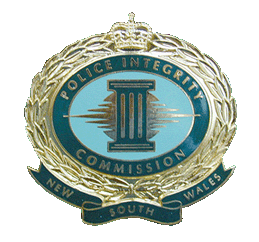Related Research Articles

The Independent Commission Against Corruption (ICAC), an independent agency of the Government of New South Wales, is responsible for eliminating and investigating corrupt activities and enhancing the integrity of the public administration in the state of New South Wales, Australia. The Commission was established in 1989, pursuant to the Independent Commission Against Corruption Act, 1988 (NSW), modeled after the ICAC in Hong Kong.

The Royal Commission into the New South Wales Police Service, also known as the Wood Royal Commission was a royal commission held in the State of New South Wales, Australia between 1995 and 1997. The Royal Commissioner was Justice James Roland Wood. The terms of reference were to determine the existence and extent of corruption within the New South Wales Police; specifically, it sought to determine whether corruption and misconduct were "systemic and entrenched" within the service, and to advise on the process to address such a problem.

The District Court of New South Wales is the intermediate court in the judicial hierarchy of the Australian state of New South Wales. It is a trial court and has an appellate jurisdiction. In addition, the Judges of the Court preside over a range of tribunals. In its criminal jurisdiction, the Court may deal with all serious criminal offences except murder, treason and piracy. The Court's civil jurisdiction is generally limited to claims less than A$750,000.
The Administrative Decisions Tribunal of New South Wales (ADT) was established in 1997 and was replaced in 2014 by the NSW Civil and Administrative Tribunal (NCAT). It did not have general jurisdiction, but had various jurisdictions conferred by particular statutes. It was responsible for reviewing decisions of some New South Wales government departments, for hearing discrimination complaints referred by the President of the New South Wales Anti-Discrimination Board, for hearing complaints about professional misconduct and for hearing disputes over commercial leases.
The Government and Related Employees Appeals Tribunal of New South Wales was a tribunal established under the Government and Related Employees Appeal Tribunal Act 1980 (NSW). It heard certain promotional appeals and disciplinary appeals from employees of the Government of New South Wales. It commenced operation on 1 September 1980 and ceased operations on 1 July 2010, when its functions were subsumed by the Industrial Relations Commission of New South Wales.
The Guardianship Tribunal of New South Wales, a former specialist disability tribunal of the Government of New South Wales for people with cognitive incapacity, or disability operated between 1989 and 2013. The Tribunal was superseded by the New South Wales Civil and Administrative Tribunal (NCAT) which came into effect from 1 January 2014. Its functions now operate within a divisional context in the NCAT.

The Workers Compensation Commission of New South Wales is a tribunal in the Australian State of New South Wales. It has unlimited jurisdiction within the state in workers compensation matters.

The Industrial Court of New South Wales was a court within the Australian court hierarchy that exercised the judicial functions of the Industrial Relations Commission of New South Wales within the Australian state of New South Wales. The Commission has exclusive jurisdiction in respect of industrial disputes in that state.

The Industrial Relations Commission of New South Wales conciliates and arbitrates industrial disputes, sets conditions of employment and fixes wages and salaries by making industrial awards, approves enterprise agreements and decides claims of unfair dismissal in New South Wales, a state of Australia. The Commission was established with effect from 2 September 1996 pursuant to the Industrial Relations Act, 1996 (NSW).

The Police Integrity Commission, a statutory corporation of the New South Wales Government, is responsible for the prevention, detection, and investigation of alleged serious misconduct in the Police Force in the state of New South Wales, Australia. The mission of the commission is to be an effective agent in the reduction of serious police misconduct.
The Local Government Pecuniary Interest and Disciplinary Tribunal of New South Wales is a former tribunal which dealt with complaints about local councils in New South Wales, a state of Australia. The tribunal began operations on 1 July 1993. On 1 January 2005, the tribunal's name was changed from Local Government Pecuniary Interest Tribunal reflecting an increase in its functions. On 1 January 2014 its functions were merged into the newly established New South Wales Civil and Administrative Tribunal (NACT).
Courts of Marine Inquiry and Boards of Marine Inquiry are tribunals established in common law countries to investigate matters relating to shipwrecks, casualties affecting ships, or charges of incompetency or misconduct on the part of the masters, mates or engineers of ships.

The New South Wales Court of Appeal, part of the Supreme Court of New South Wales, is the highest court for civil matters and has appellate jurisdiction in the Australian state of New South Wales.

The New South Wales Crime Commission is a statutory corporation of the Government of New South Wales. It is constituted by the Crime Commission Act 2012, the object of which is to reduce the incidence of organised crime and other serious crime in the state of New South Wales, Australia.
The Nurses and Midwives Tribunal is a former tribunal that was established in the Australian state of New South Wales which dealt with appeals and complaints of professional misconduct by nurses and midwives. The tribunal generally heard matters after the Nurses and Midwives Board has made a decision or a professional association had referred an issue to the tribunal. The tribunal heard matters in an informal manner in an attempt to do justice in the matter. The tribunal also conducted inquiries into complaints referred by the New South Wales Health Care Complaints Commission.
The Judicial Commission of New South Wales is an independent statutory corporation of the New South Wales Government that provides sentencing information and continuing education to and examines complaints made against judicial officers in New South Wales, Australia.
The Physiotherapists Tribunal is a former tribunal established in the Australian state of New South Wales which dealt with appeals and complaints of professional misconduct by physiotherapists.
The Community Services Appeal Tribunal was an independent tribunal established in the State of New South Wales to deal with breaches of community welfare legislation, as well as handling appeals against licensing decisions in respect of child care services, boarding houses, and foster carers. The tribunal provided the first forum in New South Wales for alternative dispute resolution in New South Wales for resolving disputes. The tribunal replaced the Community Welfare Appeals Tribunal which was known as CWAT.

The Queensland Council for Civil Liberties (QCCL) is a voluntary organisation in Australia concerned with the protection of individual rights and civil liberties. It was founded in 1966 in order "to protect and promote the human rights and freedoms of Queensland citizens." The QCCL is regularly asked by the Government to make submissions to committees, which is how bills are made in Parliament. These submissions cover issues such as closed circuit television, abortion law reform, sentencing issues in our court system and changes to legislation already in place, which are called amendments.

The Independent Broad-based Anti-corruption Commission (IBAC) is Victoria's anti-corruption agency with jurisdiction over the public sector. It does this by: